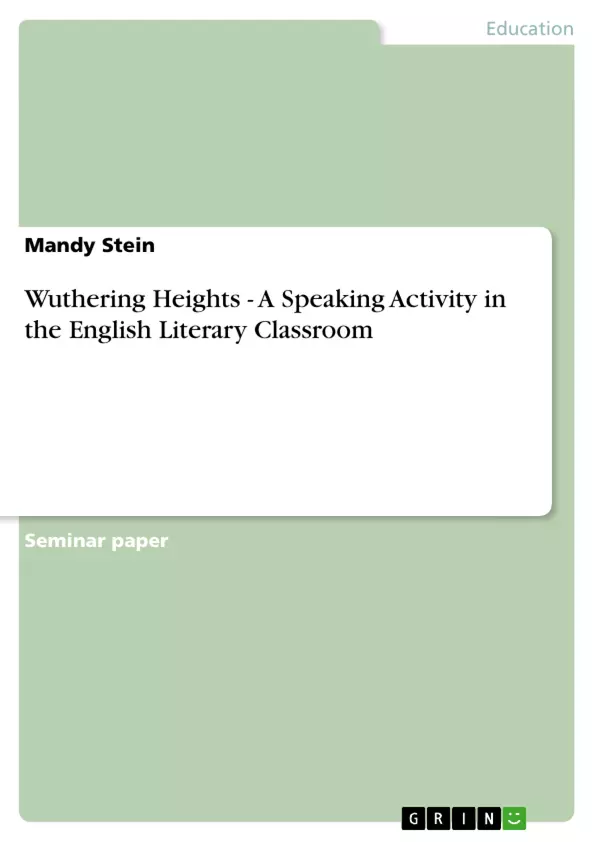[...] In the first chapter of this term paper speaking activities (in general) in the classroom will be explained in detail. In chapter two I am going to show a literary unit concerning Emily Bronte’s novel Wuthering Heights, which gained her a major place in the context of Victorian novels and is still today a widely read and adapted book for theater and movies. Many famous novels of that time are still in the curriculum today but especially to children and teenagers it is complicated to achieve access to this specific time because of certain political or social situations unknown today and the involvement of difficult vocabulary. Although there are many famous movies adapting these novels it is
not the teenager’s interest to watch them. When ‘there is no action involved’ so why not rather watch the new Harry Potter movie? Wuthering Heights offers interesting characters like Heathcliff, whom you can neither like nor dislike for his behavior towards Catherine. The story itself is full of tricky, distracting and ghostly elements which can raise the interest of the class and the story itself offers a basis for interesting discussions among the students. In chapter three, I am going to talk about the speaking activity the class will be doing during the approach of Wuthering Heights to get a better connection to its story and make the students speak about it. During the explanation of
the activity in chapter three I will first talk about the aims of it explicitly, second describe the whole preparation phase, third the activity itself in its performance and fourth I will have a reflection on the activity and its possible application in class with its faults and potency. Finally, I will draw a conclusion about the standard of speaking activities in class and their further developments in the foreign language classroom. [...]
Inhaltsverzeichnis (Table of Contents)
- 0. Introduction
- 1. Speaking Activities in the classroom
- 1.1. The correction of errors
- 2. The teaching unit Wuthering Heights by Emily Bronte
- 3. The Speaking Activity: Students playing the characters
- 3.1. Getting started
- 3.2. The Task
- 3.3. During the Activity
- 3.4. After the activity
- 3.5. A Reflection about the Speaking Activity
- 4. Conclusion
- 5. Works cited
- 6. Attachments
- 6.1. The Task for the Group Work
- 6.2 The Guided Dialogue Wuthering Heights (Emily Bronte, 1992, 68-70)
Zielsetzung und Themenschwerpunkte (Objectives and Key Themes)
This term paper aims to explore the importance of incorporating speaking activities into English language classrooms, specifically focusing on a unit based on Emily Brontë's *Wuthering Heights*. It examines how such activities can foster student confidence and improve communicative competence. The paper details a specific speaking activity designed around the novel, outlining its implementation and reflection on its effectiveness.
- The role of speaking activities in second language acquisition.
- Strategies for error correction in spoken English.
- Using literature (specifically *Wuthering Heights*) as a basis for communicative activities.
- Designing and implementing effective speaking activities.
- Assessing the impact of speaking activities on student learning.
Zusammenfassung der Kapitel (Chapter Summaries)
The introduction establishes the importance of speaking skills in English language learning and introduces the focus on a speaking activity based on *Wuthering Heights*. Chapter one discusses general speaking activities in the classroom, including the complexities of error correction. Chapter two presents a literary unit plan focused on *Wuthering Heights*, highlighting its suitability for classroom engagement. Chapter three details the planned speaking activity, covering preparation, execution, and post-activity reflection. (Note: the conclusion and final chapter are excluded to avoid spoilers.)
Schlüsselwörter (Keywords)
Speaking activities, English language teaching, error correction, communicative competence, *Wuthering Heights*, Emily Brontë, second language acquisition, classroom activities, literature-based instruction.
Frequently Asked Questions
How can "Wuthering Heights" be effectively taught in the English classroom?
The paper suggests using literature-based speaking activities, where students role-play characters like Heathcliff to engage with the complex social and emotional themes of the novel.
What are the benefits of speaking activities for language learners?
Speaking activities help build student confidence, improve communicative competence, and provide a practical way to use new vocabulary in context.
How should teachers handle error correction during speaking tasks?
Chapter one of the paper discusses strategies for error correction, balancing the need for accuracy with the goal of maintaining student fluency and motivation.
Why is "Wuthering Heights" relevant to modern teenagers?
Despite its difficult vocabulary, the novel features tricky element, ghostly atmosphere, and polarizing characters that can spark intense classroom discussions.
What does the specific speaking activity involve?
The activity involves students "playing the characters," using guided dialogues and group work to bring the Victorian setting into a modern communicative context.
How can literature overcome the "lack of action" perceived by students?
By transforming passive reading into active performance and discussion, students find personal connections to the story that movies alone might not provide.
- Quote paper
- Mandy Stein (Author), 2007, Wuthering Heights - A Speaking Activity in the English Literary Classroom , Munich, GRIN Verlag, https://www.grin.com/document/119292



